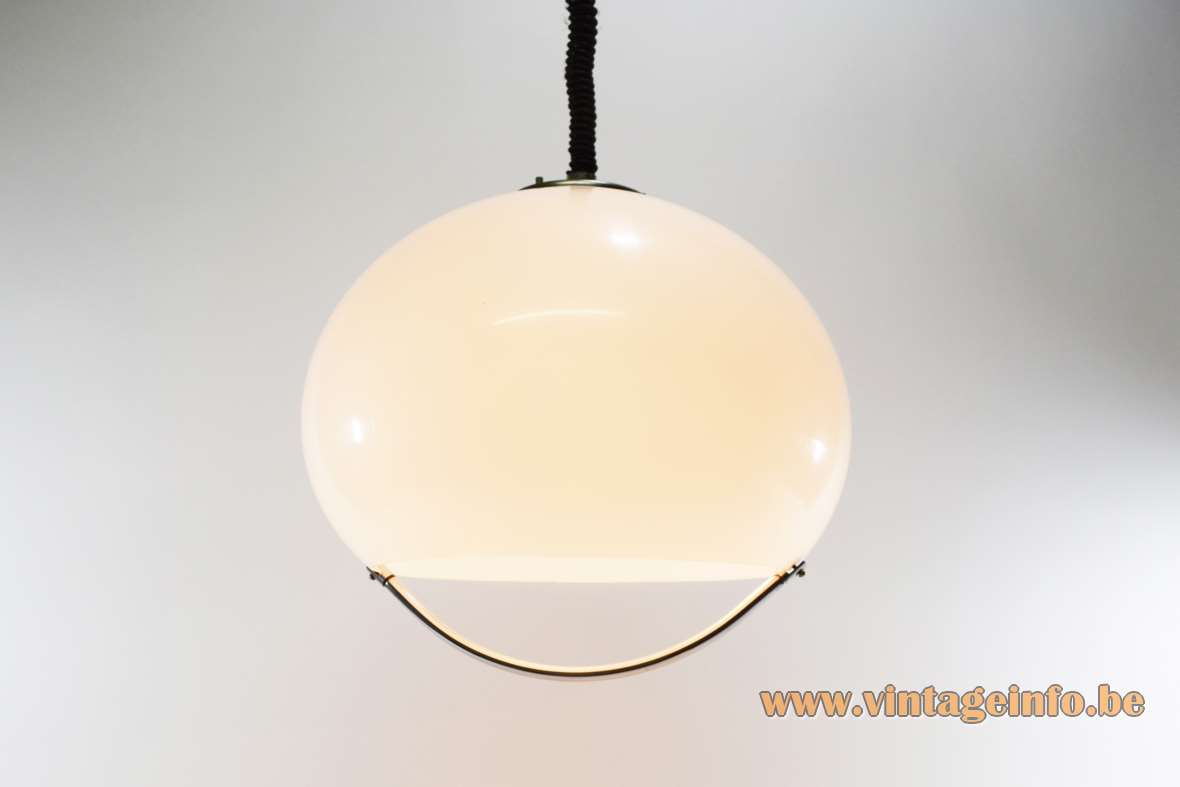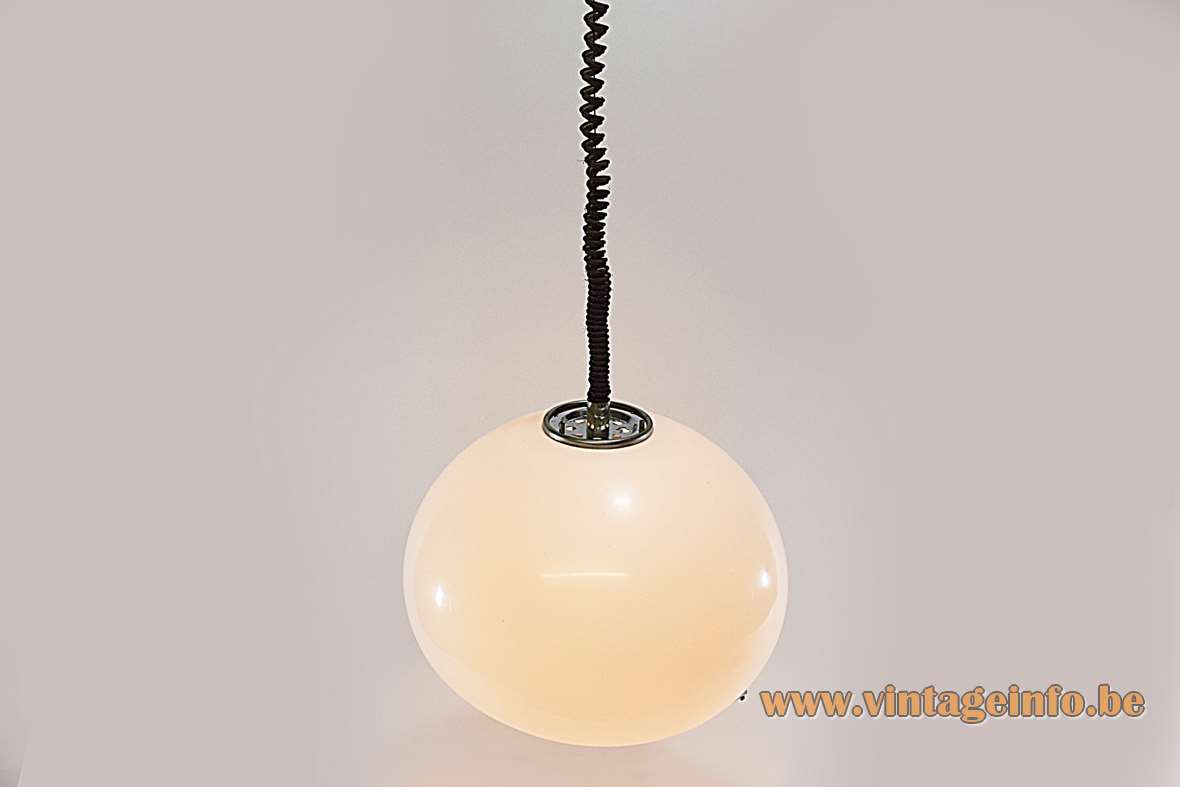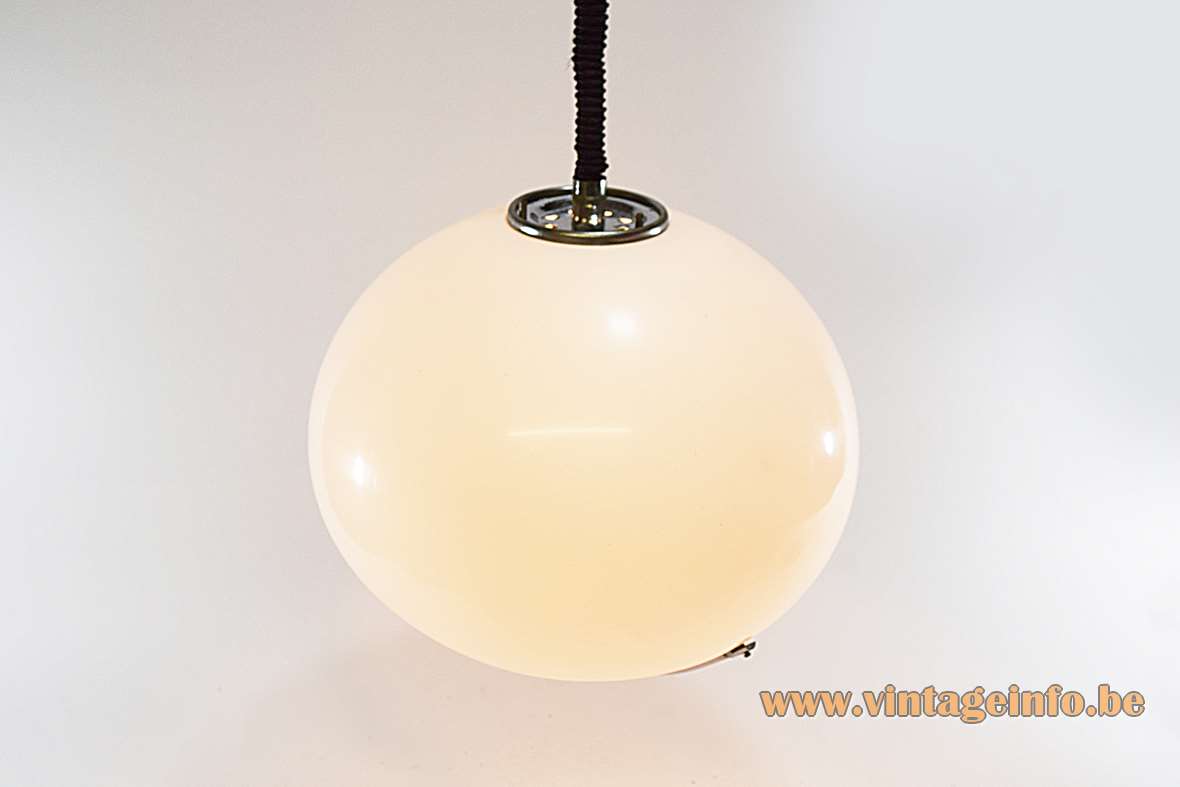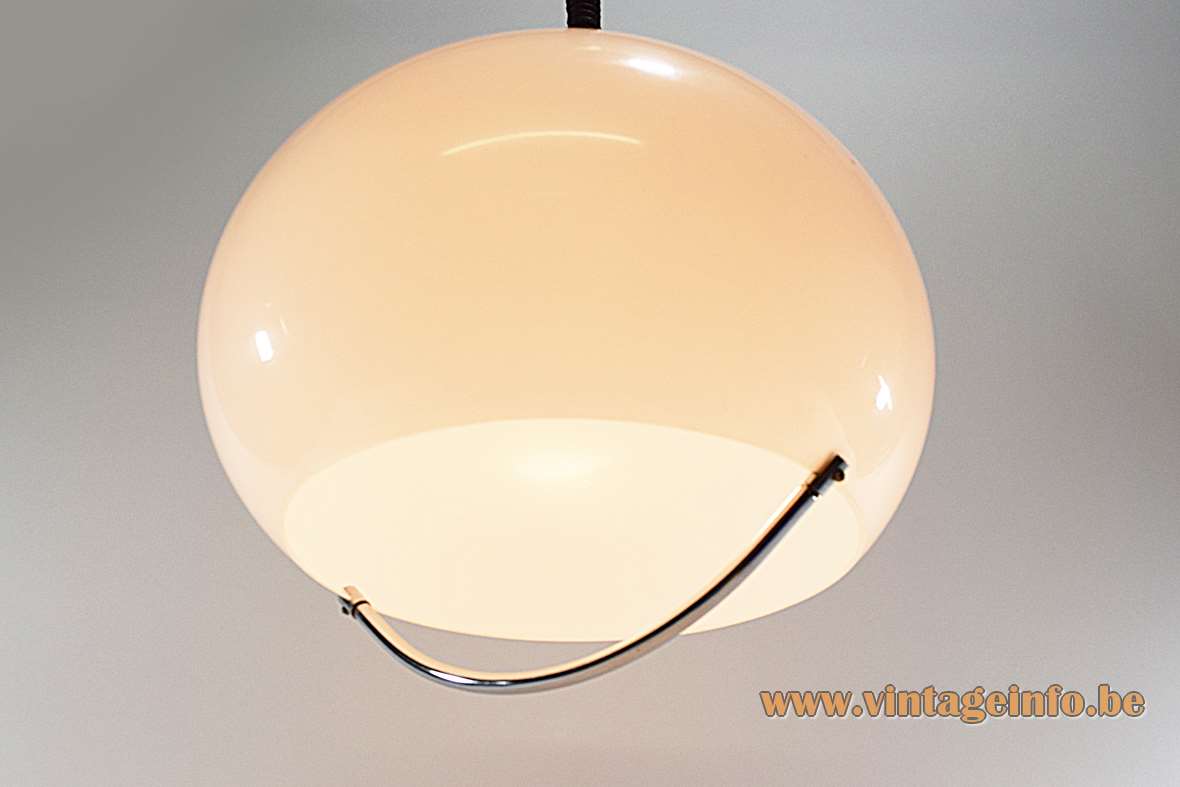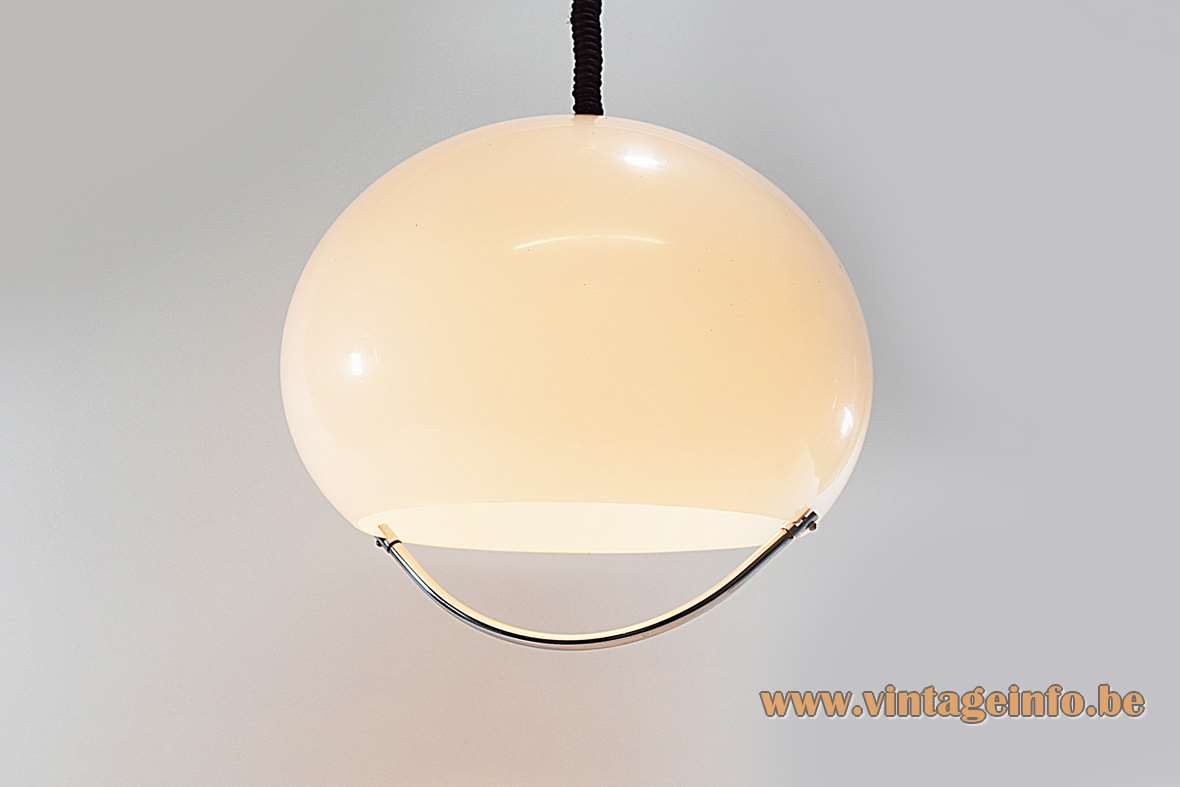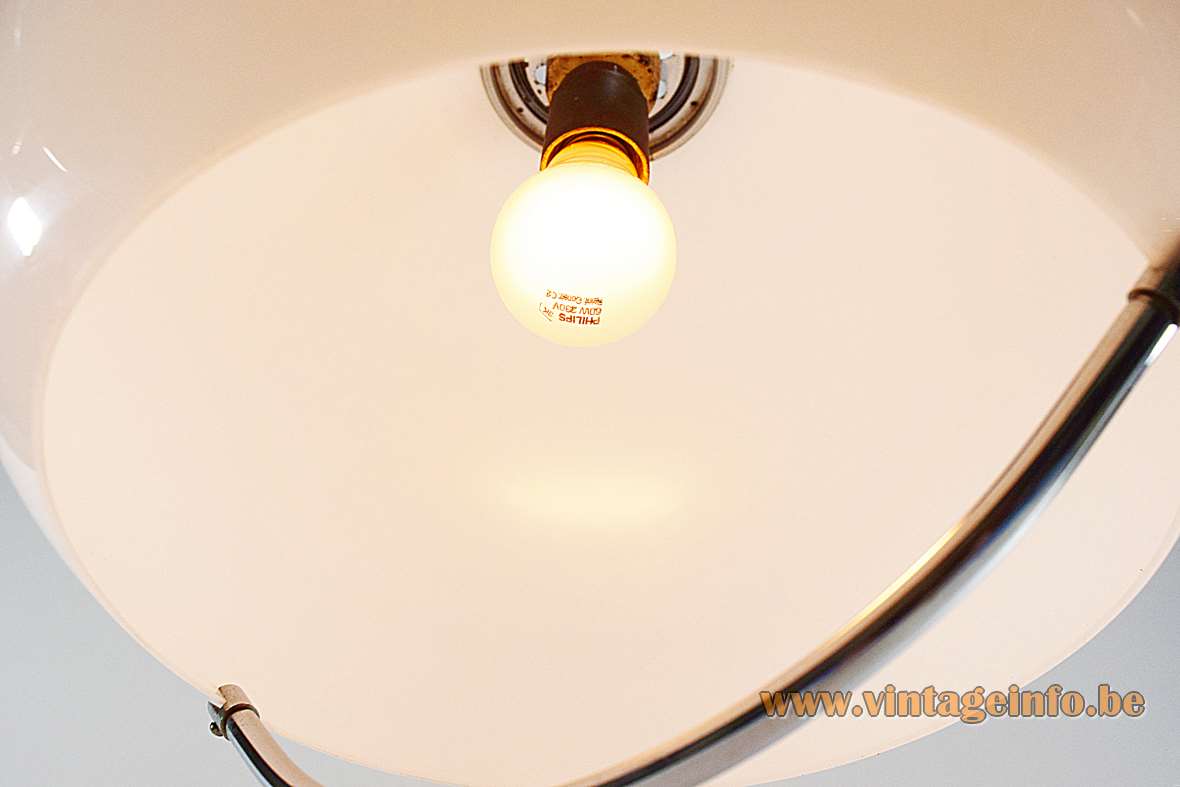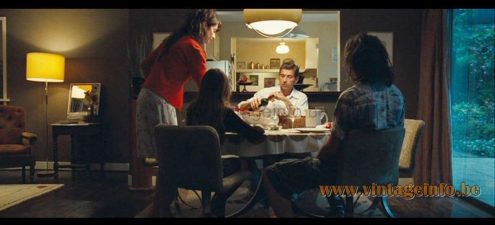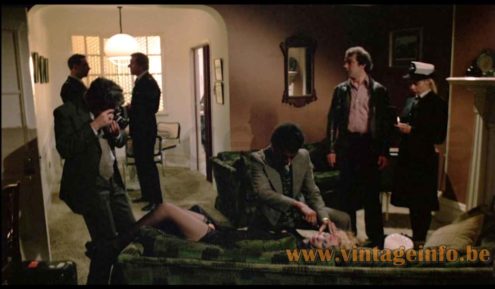Lamps in the movies!
A Harvey Guzzini pendant lamp Jolly was used as a prop in the French drama film Le Premier Jour du Reste de Ta Vie from 2008 (The First Day of the Rest of Your Life). Starring Jacques Gamblin, Zabou Breitman, Déborah François. Directed by Rémi Bezançon.
A Harvey Guzzini pendant lamp Jolly was used as a prop in the 1978 British film The Playbirds. Starring Mary Millington, Alan Lake and Glynn Edwards.
Harvey Guzzini Pendant Lamp Jolly
Materials: White acrylic globe lampshade. Chrome lamp socket holder and grid on top. Curved chrome handle. Rolly rise & fall mechanism. Metal round counterweight. Bakelite E27 socket.
Cord: This one has an adjustable rise & fall mechanism (40 – 140 cm / 15.74 – 55.11”). It can be easily adjusted in height by pulling the chrome handle underneath.
Height: 36 cm / 14.17”
Width: ∅ 35 cm / 13.77”
Electricity: 1 bulb E27, 1 x 60 watt maximum, 110/220 volt.
Any type of light bulb with an E27 socket can be used.
Period: 1960s, 1970s, 1980s – Mid-Century Modern.
Designer: Luigi Massoni (1930 – 2013) in 1968.
Manufacturer: Harvey Guzzini/iGuzzini, Via Mariano Guzzini, 37. 62019, Recanati, Italy.
Other versions: Also made in a big version 46 cm / 18.11”. The Jolly pendant lamp is always provided with a chrome handle and a rise & fall mechanism by Rolly.
The Harvey Guzzini pendant lamp Jolly without the handle is exactly the same, but was never sold as Jolly. It has no name, only a number.
Also a version with a white diffuser inside was also made as you can see in the picture of the film Le Premier Jour du Reste de Ta Vie.
Colours: White, gradient brown, green, red, orange. Over the years some other colours were also produced. The small version was in production until 1976. The big version until 1981.
Rolly
The date on the Rolly rise and fall mechanism says: 1972. Rolly is an Italian company that produced rise & fall mechanisms for many lamp producers around the world in the 1960s, 1970s and 1980s.
Luigi Massoni
Luigi Massoni was born in Milan, Italy on January 22nd 1930 and was a architect and designer. For some thirty years, he has also worked as a freelance journalist and editor. He lived in Recanati, near Milan where he died in 2013.
After years of education at the “Collettivo di Architettura” of Milan and his first professional experiences between 1953 and 1955, he began working for Alessi and created his famous Bar set. First in 1957 together with Carlo Mazzeri the cocktail shaker and a bit later the Serie 5 containers.
Il Mobile Italiano
Together with architect Carlo De Carli, he founded “Il Mobile Italiano”. In 1959, associating a group of furniture industrialists, he founded “Mobilia”, one of the first centers for the promotion of Italian design.
Also in 1959, he began working for Boffi Cucine, realizing some of the first modular systems for the home and kitchen. For Boffi he created: the Dogu kitchen and bathroom, the Xila kitchen and bathroom, the Punto bathroom, the E15 kitchen, the AL15 kitchen and the A1 cupboard.
Marmo Tecnica Architettura
He was editor and director of “Marmo Tecnica Architettura” from 1956 until 1963. Thanks to his publications, he plays a key role in the development of industrial and craft-based businesses. His works are published in the most important Italian and foreign magazines and have been awarded numerous prizes and acknowledgements.
Harvey Guzzini
In 1962, Luigi Massoni meets the brothers Raimondo, Giovanni and Giuseppe Guzzini in Milan: it is the beginning of a fruitful collaboration. He worked for Fratelli Guzzini and Harvey Guzzini, what later changed in iGuzzini, until 1976. Not only he was the art director but the coordinator of communication and advertising campaign, bringing, as pointed out by Adolfo Guzzini “a purification of the form” and “rationality as a new social status “. He also designed the logo of Harvey Guzzini as you can see below.
Lighting
Luigi Massoni designed some of the most beautiful lights for Harvey Guzzini, such as the Brumbry, the Alvise, the Toledo and the lamp set Moana and these pendant lamps named Jolly.
From this experience he improved the image of many Italian and worldwide industries operating in many sectors: Furnishings; Plastics; Glass; Ceramics; Metals; Precious metals; Leather; Giftware; Household articles and so on. To name a few companies: Cedit (ceramics), Gabbianelli (ceramics), Venini (glass), Nazareno Gabrielli (bags), Poltrona Frau (leather seats), Gallotti & Radice (Adam glass table)…
iGuzzini
iGuzzini illuminazione was established in June 1958 by Raimondo Guzzini (born 1928) under the name Harvey. Harvey is derived from the famous movie ‘Harvey’ with James Stuart and the invisible rabbit Harvey from 1950.
The initial production of enameled copper objects was supplemented by decorative luminaires.
In the early sixties it became a family business when his 5 brothers joined the company. In 1962 Luigi Massoni was attracted to lead the design team. He worked for Fratelli Guzzini and Harvey Guzzini until 1976. Luigi Massoni designed many iconic lamps in that period.
iGuzzini
The company still exists and changed the name in 1974 into iGuzzini and in 1981 to iGuzzini illuminazione.
Acrylic
Acrylic is known by several names: Perspex, lucite, acrylic glass, Crylux, Plexiglas, Acrylite and many other trade names.
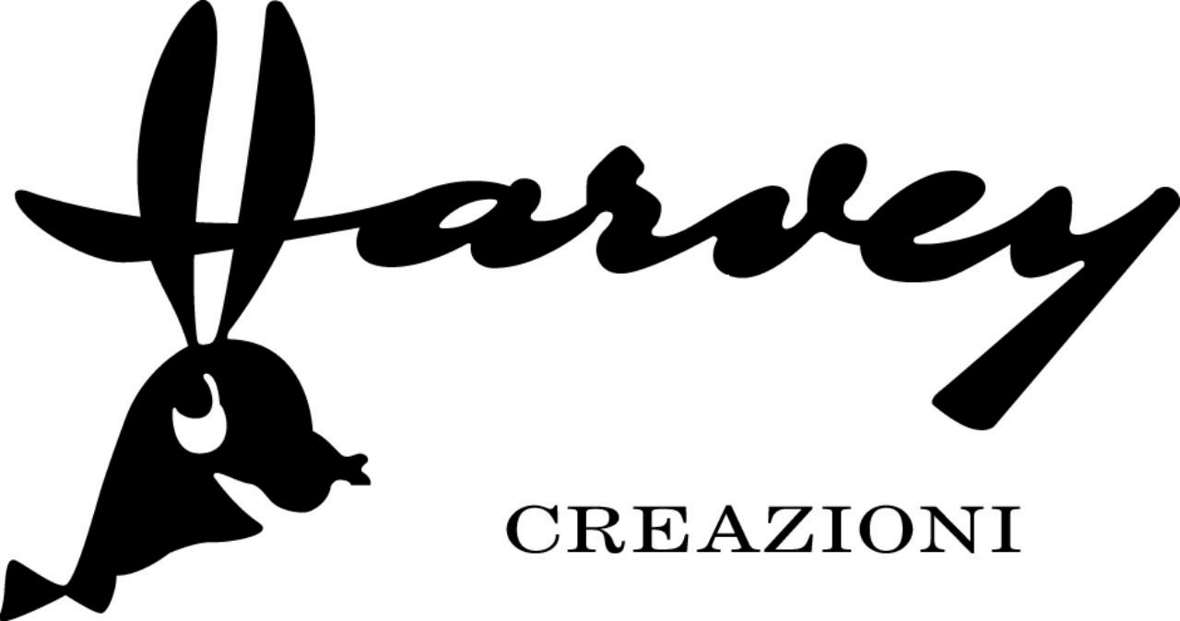
Logo used between 1959 and 1964. Inspired by the 1950 film “Harvey“, starring James Stewart.
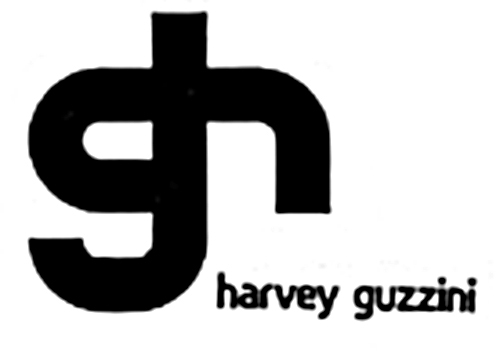
Logo used between 1965 and 1977. This logo was designed by Luigi Massoni.
The architect Massoni was invited to work with Harvey as the company’s art director, a move that gave further impetus to the idea of collaborating with designers.
Between 1967 and 1971, Ennio Lucini designed the catalogue tor the DH brand, under which lamps for home lighting were marketed.

Logo used from 1974 until today, designed by Advema G&R Associati. This logo embodied the company’s entire output, which was marketed under other brands such as DH, Doma and Atelier.
It was during this period that the company began making technical products. Spot and flood lights in particular.
